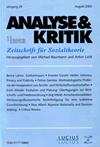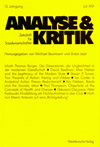Suchergebnisse
"Peter Singer"
Titel: Die moralische Bedeutung politischer Grenzen
Autor: Frank Dietrich
Seite: 248-258
Abstract: In his recent book One World one of Peter Singer's main concerns is the preferential treatment of compatriots. Two aspects of Singer's theoretical reflections on this issue are critically discussed: the use of an impartiality test as basis for the justification of special duties and the resulting condemnation of partial preferences for compatriots. Subsequently, an alternative way to justify special duties is outlined and applied to the case of fellow citizens. It is argued, that partiality to compatriots can be defended, if special duties are regarded as a constitutive part of valuable relationships.
Titel: Utilitarismus, Menschenrechte und Nichtregierungs-Organisationen
Autor: Thomas Kesselring
Seite: 259-274
Abstract: The following comment on Peter Singer's One World is divided into four parts. It starts with some objections against Singer's utilitarian approach (1). Then it argues for an 'Ethics of Globalization' which at the same time has universal validity and maintains context sensitivity (2). In part three it is shown that these two conditions are better fulfilled by an ethics based on Human Rights than by an utilitarian ethics. In this context John Rawls, 'Law of Peoples' is defended against Singer's criticism (3). In the final part the role of Non Governmental Organizations (NGOs), which are not mentioned by Singer' is analyzed. It is argued that in a world in which the states are overcharged, the United Nations weakened and the Transnational Companies, power is increasing, the NGOs get growing responsibility up to the point that many of them turn out to become Human Right's advocates and Human Right's guardians (4).
Titel: Four Charges Against the WTO
Autor: Mark S. Peacock / Michael Schefczyk / Peter Schaber
Seite: 275-284
Abstract: My comment on the third chapter of Peter Singer's One World consists of two parts. In the first, I criticise a common but simplistic approach to the issue of economic globalisation. This approach presumes that charges against the WTO can be translated - more or less directly - into charges against current development trends of the global economy. The WTO is not the only institution that legally structures the global economy, nor are decisions of the GATT or WTO panel necessarily reliable indicators of the major trends in the ever more integrated world market. It is, moreover, far from clear whether competition between jurisdictions leads to a 'race to the bottom'. In the second part of the paper, I (i) criticise the idea of a general conflict between 'the market' and 'democracy'. (ii) I defend the WTO's consensus rule against Singer's charge of being 'a very strange view of democracy' and try to make its benefits clear.
Titel: One World. A Response to my Critics
Autor: Peter Singer
Seite: 285-293
Abstract: The following response to the essays by Dietrich, Kesselring and Schefczyk discusses impartiality and foundations of special duties; utilitarianism, foreign aid, NGOs and human rights; and ethical aspects of free trade and the World Trade Organization.
Titel: Zwischen Leben entscheiden: Eine Verteidigung
Autor: Peter Singer / Helga Kuhse
Seite: 119-130
Abstract: We examine the view that all human life is of equal worth or sanctity. We find that this view is a legacy of the Judeo-Christian tradition, and cannot be justified in non-religious terms. We therefore argue that it should be rejected, and that we should openly acknowledge that some lives are of less worth than others. We then consider a common objection: that this will lead us down a slippery slope to Nazi-style atrocities. We give our reasons for finding this objection unpersuasive. We explain why no-one has any grounds for feeling threatened by our proposal. Finally we discuss who should make the decision involved in selecting whether a person should come into existence, and how that decision should be carried out.
Titel: Peter Singer und die Pädagogik für Behinderte. Der Beginn der Singer-Affäre
Autor: Christopher Anstötz
Seite: 131-148
Abstract: The article gives an account of the prelude to an extensive ethical debate in Germany which was sparked off by an invitation to the Australian philosopher Peter Singer to speak at the University of Dortmund. He was to lecture about the right to life of severely handicapped new-born babies. But among special educators this theme provoked violent protests throughout the country; organisations of the disabled and various other groups forced the cancellation of the lecture and discussion with Peter Singer The kind of dispute which follows in special education is not to be judged without consideration of the methodological background of this young discipline. The events around the ,Singer affair, have shown severe methodological deficits, which may or rather must be cured in future.
Titel: Ein guter Philosoph ist stets darauf bedacht, ob nicht auch ein anderer Böses macht
Autor: Hartmut Kliemt
Seite: 174-189
Abstract: The fact that Peter Singer was prevented from lecturing in Germany as well as the fact that the discussion of his book ,Practical Ethics, was rendered impossible raises important questions about freedom. Surprisingly some philosophers have joined the political factions which strive to suppress free discussion. In this quite polemical article some of their views are rejected. The only way to weed out error is free discussion.
Titel: Utilitaristische Ethik und Tötungsverbot. Zu Peter Singers Praktische Ethik
Autor: Dieter Birnbacher
Seite: 205-218
Abstract: One of the standard criticisms of classical utilitarian is that it is unable to provide an adequate ethical foundation for the wrongness of killing. It is reasoned that the five arguments against killing available to the classical utilitarian are indeed sufficient to provide such a foundation and that recourse to preference utilitarianism is neither called for nor helpful since it generates a number of problems of its own. On this basis, Singer's discussion of selective abortion and the selective euthanasia of newborns is criticized from within utilitarianism for not giving sufficient weight to direct and indirect social side-effects, especially if ,external, criteria are introduced into the valuation of human life.
Titel: Kindstötung und das Lebensrecht von Personen
Autor: Norbert Hoerster
Seite: 226-244
Abstract: According to the view of Peter Singer, only persons deserve a right to life. As a consequence, a human being can claim such a right only at a certain point of its postnatal development and there is no essential moral difference between infanticide and abortion. Against this view, it is argued that - even on the basis of personhood as the fundamental criterion there are convincing pragmatical reasons for attributing a right to life in social practice at the point of birth. It is also shown how this position can be combined with a morally satisfactory position on the important problem of the treatment of infants who are severely handicapped.
Titel: The 'Singer-Affair' and Practical Ethics: A Response
Autor: Peter Singer
Seite: 245-264
Abstract: This response to the articles in this issue of ,ANALYSE & KRITIK, begins with some general remarks on the ,Singer-Affair, in which I suggest that while the rational discussion of the ethical issue of euthanasia poses no threat of a return to Nazism, there is a real danger in the creation of a climate in which people are ready to use force to suppress ideas with which they disagree. I then state and criticise two popular theses about the wrongness of killing: that there is a crucial moral distinction between an act and an omission, and that all human beings possess an intrinsic right to life that no nonhuman beings have. This serves as a background to the section that follows, in which I take up the detailed criticisms of my views made by Professors Lenzen, Birnbacher, J. C. Wolf and Hoerster.

Legitimationsprobleme der Globalisierung
2003 (25) Heft 2
Editorial
Im Jahr 2000 entsprach der Anteil aller grenzüberschreitend gehandelten Waren und Dienstleistungen mehr als einem Viertel des weltweiten Angebots, während es noch 1970 nur etwa 10% waren. Zugleich 'globalisierte' sich in rapider Geschwindigkeit der Aktionsradius vieler Unternehmen. Allein im Jahr 2000 investierten diese Unternehmen 1,3 Billionen Dollar über Grenzen hinweg. Gemessen an ihren Umsätzen ist inzwischen eine Gruppe von etwa 15 Unternehmen kapitalstärker als die 60 ärmsten Staate...

Euthanasie heute - Thema oder Tabu?
1990 (12) Heft 2
Editorial
Der australische Philosoph Peter Singer soll mit Gewalt zum Schweigen gebracht werden. Er hat mit der Euthanasie ein moralisches Problem zum Thema der öffentlichen Erörterung gemacht, das nach Meinung seiner deutschen Gegner ein Tabu bleiben muß. Die Botschaft, die von diesen Gegnern Singers ausgeht - unter ihnen eine Reihe von Philosophieprofessoren -, besteht nicht darin, daß Singer Auffassungen vertritt, die in der Sache hart kritisiert werden müssen, sondern die Botschaft lautet: Man so...